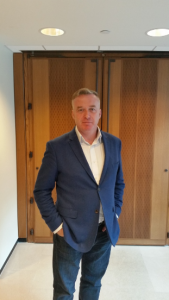
Brian Lilley of The Rebel says that the CBC doesn’t represent regional diversity. | Photo – Andrew Savory
Government funding for the CBC creates an unfair playing field, a number of top media executives testified today before a parliamentary committee studying the state of the media.
The Canadian Heritage committee, chaired by Liberal MP Hedy Fry, is looking into concerns about the diversity of both regional and local coverage offered by Canadian media.
The committee heard from five prominent voices from the Canadian media industry, including Phillip Crawley, publisher and chief executive officer of The Globe and Mail.
“It’s not level if taxpayers’ dollars directed at the public broadcaster make competition for digital ad dollars more difficult,” Crawley said. “The CBC is The Globe’s largest competitor in the digital ad space amongst Canadian based media.”
“My colleagues and I in the industry do not support the notion that handing out more money to the CBC helps global or national newspapers,” Crawley said.
In an interview prior to the meeting, founder of The Rebel Ezra Levant told The Finch that he doesn’t believe the CBC represents regional diversity.
“When editorial decisions are made by a clique of ‘mean girls’ at the CBC’s offices in Toronto-Ottawa-Montreal, you have a political monoculture,” said Levant. “They don’t care about regional diversity.”
The committee also heard from Brian Lilley, co-founder of The Rebel, who was filling in for Levant.
Lilley said the CBC’s music streaming service is a departure from the CBC’s mandate and a misuse of their “billion and a half dollar” subsidy.
“That’s not the job of CBC. You can’t show up to Parliament and say ‘we don’t have enough money’ and start new business lines that will draw resources away,’ Lilley said. “We taxpayers are paying the royalties, why?” Lilley said the CBC should be shut down for violating its mandate.
Michael Gruzuk, director of news and digital programming for VICE, said the digital medium has aided VICE’s growth.
Gruzuk credited mobile and online technology for allowing VICE to boast 11 different channels of digital content that caters to local and regional communities through online publication, mobile platforms, linear TV, and film.
“We do travel to these local communities and are committed to telling stories there,” Gruzuk said. “We go over the stories of interest and we tell it in a way that’s relevant to youth in those communities and we find that its relevant to youth around the world,” he said. “We can be present without being rooted in one place.”
Joining Crawley, Lilley and Gruzuk on the panel were Pierre Martineau, director general of news and programming for Cogeco Media, as well as Jean-François Dumas, president of Influence Communication.
